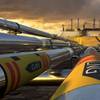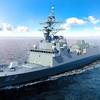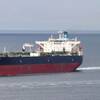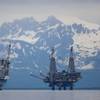A high-tech infrared camera system now monitors the port of Valdez and vessels transiting Prince William Sound. This Infrared maritime surveillance system supplements the extensive maritime and land-based homeland security measures put in to action in Valdez and around the nation following the tragic events of Sept. 11, 2001.
Culminating a two-year effort by the Valdez port security committee, last week Scientific Applications International Corporation (SAIC) put the finishing touches on and energized a state-of-the-art infrared camera port security surveillance system covering the port of Valdez and the trans-Alaska pipeline oil tankers transiting Prince William Sound. This landmark
project was made possible by a $764,000 Maritime Administration (MARAD) grant and the in-kind contributions and
assistance of the City of Valdez, the Valdez Police department, Doyon Security, Alyeska Pipeline Service Company, AT&T Alascom, and the U. S. Coast Guard.
In support of this public security-enhancing project, AT&T Alascom donated tower space and installation assistance for one
camera. Alyeska and the Coast Guard are providing electrical power, tower space and microwave bandwidth to keep the
system powered up and connected. SAIC will use MARAD grant monies to handle routine maintenance.
The project, administered by the city, involves three cryogenically-cooled, ultra-high-resolution infrared surveillance cameras
placed on Coast Guard and AT&T Alascom owned towers at the north and south side of the port of Valdez with the third
camera located at the Coast Guard's communications site in the Valdez narrows.
These cameras, capable of seeing through the rain, fog, snow and darkness, detect minute differences in surface temperatures.
Monitors and camera controls for the system are located at the Valdez Police department, the Coast Guard Vessel Traffic Services center, ALYESKA-Ship Escort and Response Vessel Services (SERVS) and also at the Alyeska marine terminal.
This system greatly enhances the Coast Guard and other members of the Valdez port security committee's ability to discern objects and details impossible to see with the naked eye and existing radar systems. Because of steel's high thermal conductivity, camera shots of typical maritime steel structures, such as ships and even terminal oil tanks, appear to give the
viewer enhanced vision, revealing temperature related details "inside" the structure such as levels of oil inside tanks, locations of
running machinery, and differentially heated and cooled spaces.
Maritime security is a fairly new application for this well tested technology. The Coast Guard and other civil authorities have long used thermal imaging to detect oil spills and to assist with maritime and land-based search and rescue. Small hand held IR
units have been used by fire fighters to find victims and locate the source of the fires inside smoke filled structures and have even been used by police departments to find and combat illegal contraband growing operations and illicit drug labs.
The system leverages and further connects the existing around-the-clock navigational safety, police, and terminal safety/security
watch standing efforts at VTS, VPD, SERVS and at the terminal respectively.
The U.S. Coast Guard is a military, maritime, multi-mission service within the Department of Homeland Security
dedicated to protecting the safety and security of America.
Subscribe for
Maritime Reporter E-News
Maritime Reporter E-News is the maritime industry's largest circulation and most authoritative ENews Service, delivered to your Email five times per week










